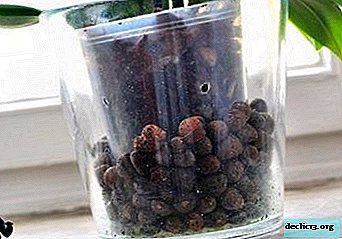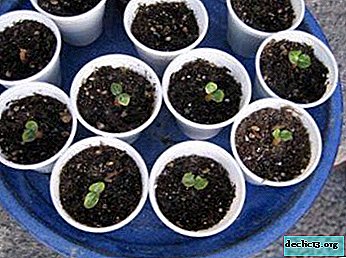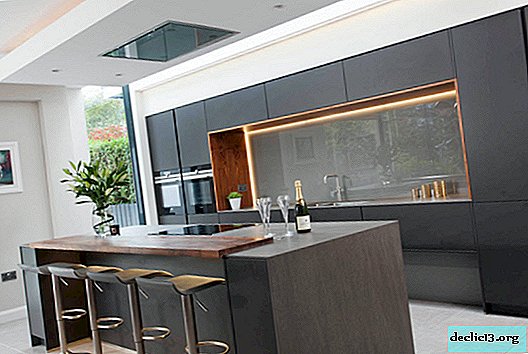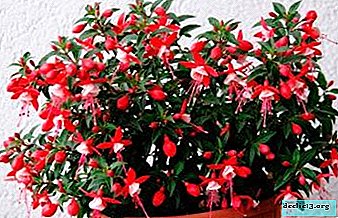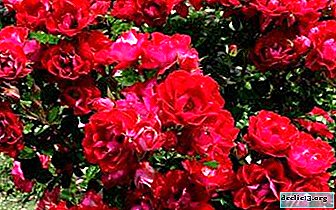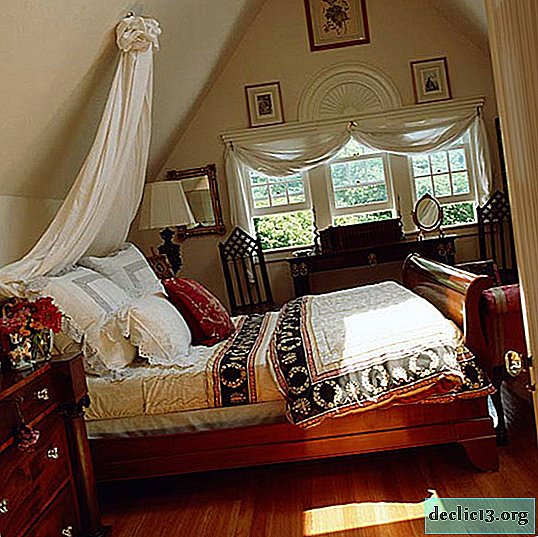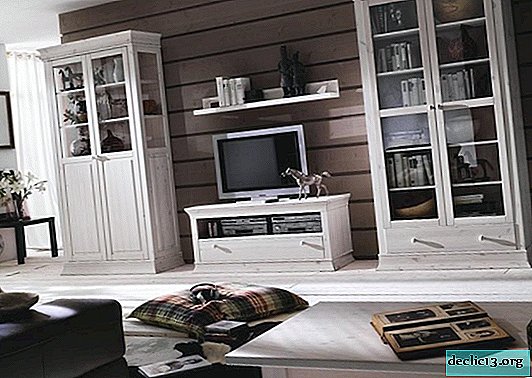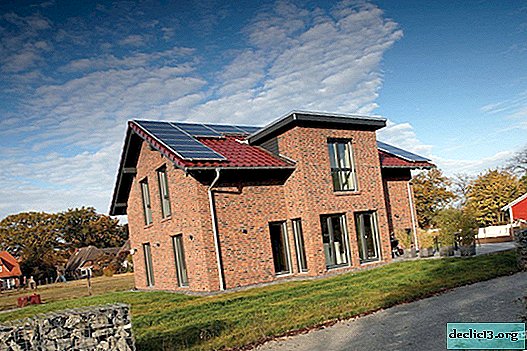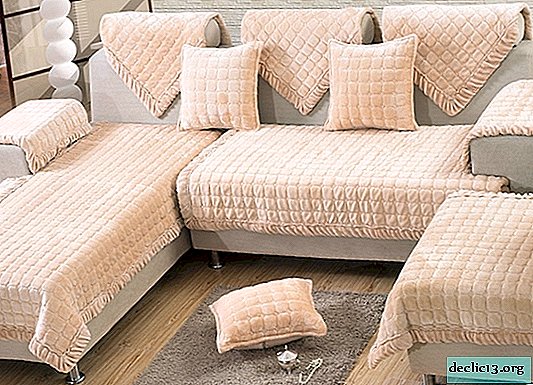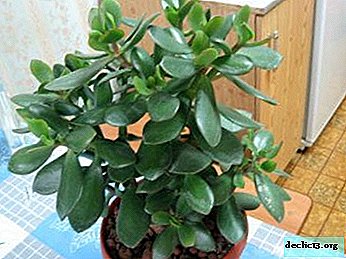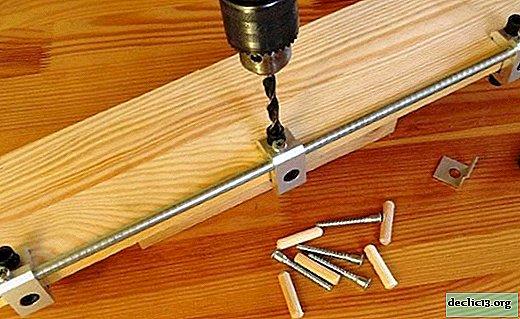The ceiling in the children's room: design ideas
Creating a design for a children's room is as interesting as a responsible task. It is necessary not only to choose the right safe, reliable and durable materials for decoration, but also to take into account the fact that for a small owner of a room it is a whole world in which he grows, develops, learns new things, rejoices and is sad. When planning a repair of a children's room, there are no trifles - you need to think over every detail - from the general concept, color palette and theme to the design of the switch. The surface, which certainly cannot be called a trifle, which will be discussed in this article is the ceiling. What decorative materials should be used to create a safe, beautiful, reliable coating, how can one diversify a traditional design, how to find original ideas for an individual approach to the themes of children's design, and at the same time not ruin the family budget? We will try to answer these and other questions with the help of a large selection of design projects of children's rooms with the most diverse design of ceilings.
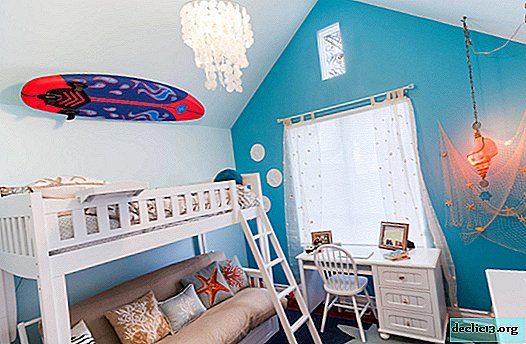

Ways to create a ceiling decoration
The ideal ceiling coating for a children's room has the following characteristics:
- environmentally friendly (safe for humans and the environment);
- durable (does not lose its aesthetic qualities and technological properties over time);
- hygienic (the environment should not contribute to the formation and spread of fungus, mold);
- safe (it is not surprising that no parent would like to see elements of the ceiling decoration showered on the child);
- harmonizing in style of execution, color and texture with the design of the whole room;
- easy to install (after all, many would like to save on the services of specialists and carry out the installation on their own);
- affordable (the design of the children's room doesn’t “live” for long, because the child is growing, his interests and preferences are changing, and the sweet, soft pink color of the room, so beloved by the five-year-old, ceases to appeal to the teenage hostess).



Unfortunately, it is impossible to find a finish option that would satisfy each item of requirements. In any case, parents will have to solve the dilemma (expensive, but of high quality, quickly, but not environmentally friendly, etc.). Based on the chosen concept of room design, your financial capabilities and experience in decorating.




Stretch ceiling
Stretch ceilings in our country are incredibly popular. A canvas made of PVC film or fabric impregnated with a special composition is stretched on a metal frame installed around the perimeter of the room. It is possible to create a perfectly flat surface by heating the canvas with a special “gun”. The advantages of this finishing method are:
- the possibility of installation without preliminary surface preparation (for apartments and houses with uneven ceilings, the presence of level differences - ideal);
- installation is quick, within 3-4 hours all work will be completed;
- the canvas does not absorb moisture and does not attract dust - an excellent finish for an allergic child's room;
- a fairly wide range of color solutions, the possibility of applying photo printing, engraving.



The disadvantages of finishing using tension structures include:
- relatively expensive cost (when compared with inexpensive wallpaper, staining);
- the need to use the services of specialists;
- after installation, an unpleasant, synthetic smell will remain for some time;
- PVC film is not an environmentally friendly material, it is not able to let air through, so the rest of the decoration of the room (walls and floors) should "breathe";
- the ceiling level after installing the tensile structure is reduced by a few centimeters (depending on the curvature of the surfaces).


Despite the serious list of shortcomings, stretch ceilings can be used as decoration for children's rooms, if you follow some rules:
- if you use a synthetic canvas for finishing the ceiling, which can change the microclimate of the room, but for walls it is better to choose paper or other natural wallpapers, and for floors - a parquet board;
- the room will need to be regularly ventilated (windows should be kept on micro-ventilation);
- if possible, then prefer a PVC film to a textile fabric with microperforation;
- you must be responsible for choosing the manufacturer of the canvas and purchase only certified products.



If we talk about design and color solutions, it is obvious that the most popular, universal and neutral version of the stretch ceiling is a snow-white satin fabric. If the room is planned for a color version of the walls (at least one, accent), then the best option for creating a neutral ceiling background is a snow-white version. For small spaces, this finishing method will be optimal, the white color in a glossy design will help visually increase the height of the ceiling.



Bright execution of the tensile structure can become an original accent of the interior. But it is important to understand that this way of attracting attention to the ceiling is only suitable for rooms with sufficient height. In rooms with low ceilings, bright decoration can create a negative psychological effect, creating a "heavy" atmosphere in the room.



We use drywall
Ceiling with drywall is an inexpensive, practical and fairly durable way to create a beautiful and environmentally friendly coating. This finish option has many more advantages than disadvantages:
- from the name of the material it is clear that it consists only of environmentally friendly raw materials - cardboard and gypsum;
- the material has hypoallergenic properties;
- plasterboard ceiling will help solve the problem of noisy neighbors, as possesses excellent soundproof qualities;
- good thermal insulation is another advantage of drywall sheets;
- ease of processing, sufficient flexibility of the material allows for the implementation of various design ideas, the use of complex lighting systems with different types of fixtures (local devices or strip lights);
- gypsum plasterboard can be mounted on the untreated surface of the ceiling and you can do it yourself if you have the necessary tools and skills for finishing work;
- gypsum board has a high fire safety - only a layer of paper can burn, the gypsum itself is charred, does not contribute to the spread of fire.



The disadvantages of using drywall as a finishing material include the following:
- installation is a rather time-consuming process, takes a lot of time and leaves a lot of dirt after completion of work;
- ceiling height inevitably decreases;
- the installation of drywall does not finish - you need to repair the seams, smooth the surface and apply the final painting, wallpapering or any other type of decoration (which can significantly affect the environmental friendliness of the design, not to mention the additional cost of money, time and effort).




Suspended structures
The suspended structure is ceiling modules that are attached to a metal frame. Ceiling modules can be wooden, plastic, gypsum, and even glass and mirror, the frame is most often made of a metal profile, less often - of wood or metal. From the point of view of environmental friendliness and safety, wooden and gypsum sheets for creating suspended structures are preferable for a children's room.





Suspension systems can have not only different color schemes, designs, but also the texture - be matte or glossy. Any design ideas for embedding the original lighting systems are feasible if a suspended module system is chosen for the ceiling. Using the ceiling in spirit levels, you can zone a spacious room, highlight functional segments (a zone of sleep and relaxation, games and creativity, or use the levels to conditionally separate segments if two or more children live in the same room).




An advantage of suspended structures is the ability to hide all communications "inside" the ceiling. Also, an important plus is the possibility of creating the so-called "air cushion". For the upper floors of high-rise buildings and private buildings, the possibility of insulation (if necessary, you can use insulation material between the ceiling surface and the shelf modules) plays a large role.




There is only one obvious drawback - when creating a suspension system, a large amount of space is “eaten up” - the height of the room is reduced by 10-15 cm, which can be critical for standard apartments dating back to the last century. And to create the atmosphere of a children's room, in which the ceiling literally "presses" on anyone in the room, not a single parent wants to.




Wallpaper for ceiling pasting
Paper wallpaper is the most simple and inexpensive way to create a ceiling finish, provided that its surface is prepared, perfectly aligned. Paper canvases are environmentally friendly, affordable and presented in a wide range of colors, a variety of drawings, ornaments and prints. Among the shortcomings of paper wallpaper can be distinguished fragility, susceptibility to fading in the sun and inability to clean. But for the decoration of the ceiling, all these disadvantages are not significant.




Experts do not recommend using vinyl and non-woven wallpaper for decorating the ceilings of children's rooms. The material is not hygroscopic - it does not pass air. But in favor of such canvases, it is important to say that it is much easier to stick them on - only the ceiling needs to be smeared with glue, the canvases themselves are not deformed, they are not smeared with the pattern or the upper texture layer is removed. In addition, vinyl and non-woven wallpaper are much longer than paper wallpapers, they do not fade from sunlight and can be painted up to 5-6 times for the entire period of operation.




Natural textile wallpaper is a great way to create a beautiful and safe ceiling decoration in a child’s room. The ability to pass air, a wide palette of color and textured solutions, the ability to combine with other finishing materials - all this makes textile fabrics an attractive finishing option. In addition, being located on the ceiling, where they are not threatened with pollution, textile wallpaper lose one of the most important drawbacks - the inability to undergo cleaning, wet cleaning.



If we talk about the design, coloring and texture of wallpaper for a child’s room, then paintings with a pattern will be appropriate in a room with a neutral, light color scheme of wall decoration. You can only glue the ceiling with wallpaper with a colorful pattern if the height of the room allows you to use such a design technique.



Wall mural for original design
Photowall-paper can be allocated in a separate group of finishing materials. Thanks to modern technology, photo printing can be applied to almost any surface, options for finishing materials. The paper base is certainly one of the most popular. Photowall-paper of modern manufacturers (ready-made solutions or custom-made) have high image quality, realistic and safe for humans and the environment. With the help of photo printing you can create a difficult original design of the ceiling, but the whole world is for the small owner of the room.



One of the most common types of photo printing on the wallpaper is the image of the sky. At the same time, in the children's room, you can use both the light azure of the clear sky, the image of snow-white clouds, and the picture of the night sky, with stars, real or fictional planets. The theme of space is incredibly popular among modern children.



Other finishes
One of the most popular because of the simplicity of execution, low cost and practicality of the method of finishing the ceiling is the coating with water-based non-toxic paint. The disadvantage of this design is the need to level the surface to a perfectly smooth state.




The combination of various finishing materials or one type of raw material, but in different colors, allows you to create an original design of the ceiling. Most often, a combination of plain (light, neutral) surfaces with colored, printed zones is used. Such a combination can be "strengthened", highlighted with moldings, gypsum stucco moldings.






Decorative elements and original design
If you decide that the design of the ceiling will be an accent in the interior of the children's room, then you must be aware of the various options for decorating this surface. The easiest way to create an original image of the ceiling is by gluing acrylic stickers, stickers of interest to the finished surface. At the same time, it is not so important what material was used to decorate the ceiling; stickers adhere perfectly to the textured surface.




In order to lie, looking at the ceiling, it was not so boring, you can decorate a nursery with hanging toys, models of objects of a child’s interest, various decorative elements that a baby might like, interest him. As a rule, a certain theme is present in the entire design of the room. But, if decorative elements are actively used on the ceiling, then the remaining surfaces and basic interior items are best done in more calm colors, without unnecessary embellishments.




Another interesting, effective, but expensive way to create an exclusive design is art painting. It is obvious that in addition to the main finish to create a perfectly even and smooth ceiling, you will have to spend money on professional services. If this option seems too expensive for you and you have some experience in decorating, an artistic vision of the interior of a child’s room, then it’s fashionable to create a simple drawing or ornament on your own (using stencils, for example).






Painting the ceiling with wide stripes helps to visually increase the volume of the room. Not to mention the creation of an original design of a children's room. The choice of color of the stripes depends on the color palette of the interior, but most often one of the shades, for obvious reasons, is white.








